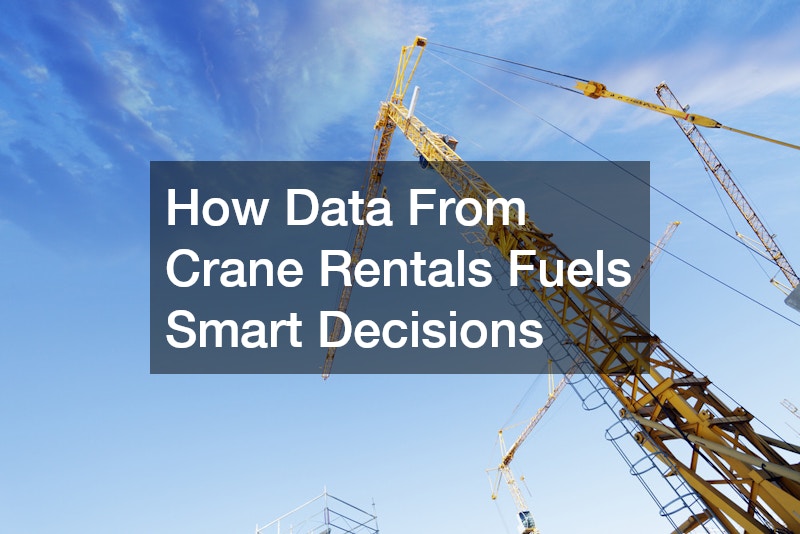
In today’s fast-paced world, the construction and logistics industries are constantly seeking ways to optimize their operations. One of the key resources that has emerged as a cornerstone for informed decision-making is data generated from crane rentals. With the use of cutting-edge technology, companies are now able to gather and analyze vast amounts of information, enabling them to make smarter choices in their business strategies.
This blog post explores how data from crane rentals is revolutionizing decision-making processes and enhancing operational efficiency.
Enhance Fleet Management

Data from crane rentals provides invaluable insights into fleet management, allowing companies to optimize their rental fleets for maximum efficiency. By analyzing usage patterns, companies can determine which cranes are in high demand and which ones are underutilized. This information enables them to adjust their inventories accordingly, ensuring that they have the right mix of equipment to meet customer needs without incurring unnecessary costs. Additionally, data-driven insights can help in scheduling maintenance more effectively, reducing downtime and increasing asset availability. With this approach, businesses can maximize the productivity of every asset while minimising waste.
Cost Optimization
One of the primary benefits of utilizing data from crane rentals is the potential for cost optimization. Companies can analyze data to understand cost drivers and implement measures to control expenses. For example, by tracking fuel consumption and wear-and-tear metrics, businesses can identify inefficiencies and take corrective actions such as optimizing usage schedules or investing in more fuel-efficient models. Having this level of financial insight helps businesses remain competitive in a tight market. In the long run, this results in stronger profit margins and more sustainable operations. As a result, companies can create safer job sites while also building trust with clients and stakeholders.
Risk Management
Crane rental data plays a crucial role in risk management, as it helps companies identify potential hazards and mitigate them before they escalate into costly problems. By analyzing historical safety data and real-time operational metrics, businesses can develop better safety protocols and training programs. This proactive approach not only enhances operational safety but also reduces the likelihood of accidents, which can have significant financial and reputational consequences. A data-driven understanding of risks helps managers make informed decisions that prioritize both safety and profitability. Such predictive insights allow businesses to plan strategically and respond quickly to market changes.
Market Demand Forecasting
Understanding market demand is a critical aspect of business success, and data from crane rentals offers valuable insights into demand forecasting. By examining historical rental trends and correlating them with external factors such as economic conditions and seasonal variations, companies can anticipate future demand more accurately. This foresight enables businesses to make informed decisions about inventory levels, pricing strategies, and resource allocation. Accurately forecasting market demand helps companies stay ahead of competitors and capitalize on emerging opportunities. Ultimately, customer-focused data strategies foster loyalty and long-term partnerships.
Improve Customer Satisfaction
Data from crane rentals also plays a pivotal role in enhancing customer satisfaction. By analyzing customer preferences and feedback, companies can tailor their services to better meet client needs. For example, insights into rental durations and equipment preferences allow businesses to offer customized rental packages that deliver value to customers. Moreover, a data-driven approach enables companies to provide timely support and maintenance, ensuring that equipment is always in optimal condition for use. High levels of customer satisfaction lead to repeat business and strengthen the company’s reputation in the industry.
Beyond service personalization, rental data also helps companies anticipate customer needs before they even arise. For instance, by reviewing historical rental records, businesses can identify patterns such as peak demand times or specific crane types that are often requested together. This allows companies to proactively recommend solutions, streamline booking processes, and minimize delays, creating a smoother customer experience. Additionally, data-driven insights empower businesses to communicate more effectively with clients by providing accurate timelines, transparent pricing, and clear performance expectations.
The integration of data analytics into crane rental operations is a transformative force that fuels smart decision-making. From enhancing fleet management and optimizing costs to bolstering risk management and improving customer satisfaction, the benefits are substantial. As technology continues to evolve, businesses that embrace data-driven strategies will likely maintain a competitive edge in the construction and logistics sectors. By leveraging the power of crane rental data, companies are not only able to make informed decisions today but also to proactively plan for future success.
